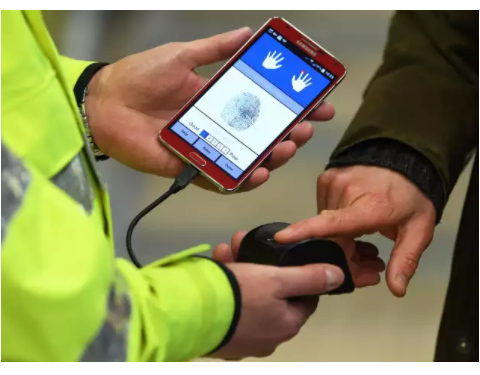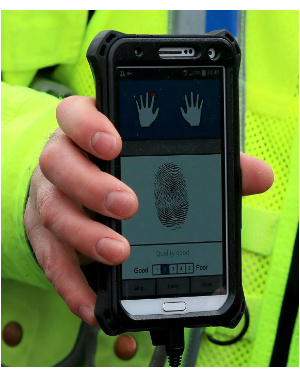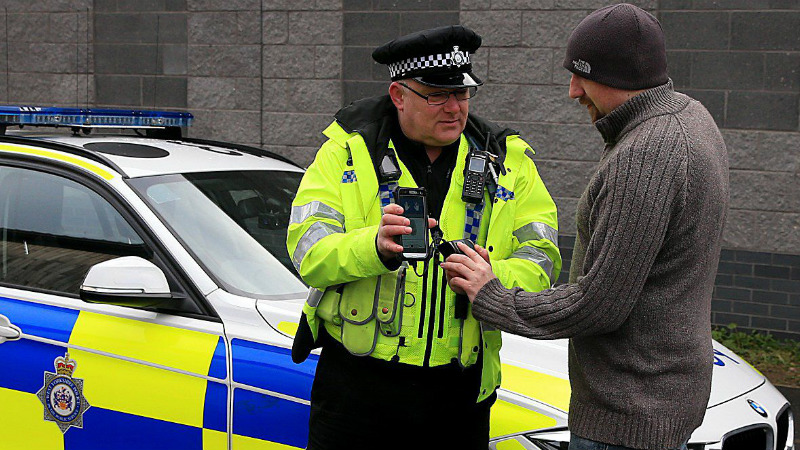New mobile fingerprint scanning technology will allow police officers across the UK to use their smartphones to identify people in less than a minute—saving hours of wasted time. A police fingerprinting app on an officer’s phone, combined with a handheld biometric scanner, allows police to check fingerprints against criminal and immigration records in live databases.
Biometric scanner + police fingerprinting app
 The mobile fingerprint scanning program is called the Biometric Services Gateway was developed by the UK’s Home Office. It connects a special handheld scanner and police fingerprint scanner app to two live databases: IDENT1 (criminal biometrics) and IABS (Immigration and Asylum Biometrics System). The Gateway is one of a series of national systems the Home Office is designing to give mobile officers faster information.
The mobile fingerprint scanning program is called the Biometric Services Gateway was developed by the UK’s Home Office. It connects a special handheld scanner and police fingerprint scanner app to two live databases: IDENT1 (criminal biometrics) and IABS (Immigration and Asylum Biometrics System). The Gateway is one of a series of national systems the Home Office is designing to give mobile officers faster information.
As well as identifying a person of interest who may be withholding their name, the technology enables officers to rapidly identify someone experiencing a medical emergency and make contact with their next of kin. To ensure the security of information, fingerprints are not stored on-device, and are automatically deleted from the device once they have been checked.
The biometric scanner system is now being rolled out as a trial of 250 scanners available to 5,500 frontline officers with West Yorkshire Police (WYP). The UK government expects another 20 forces across the country will roll out the system by the end of this year.
In one early example of the system in action, a firearms unit detained a driver after a short pursuit and used the police fingerprinting app identify him as a disqualified driver, despite him giving false details. They issued a summons for his three offences and seized his vehicle. Ten minutes later, the police unit returned to patrol. Without the mobile fingerprint scanner, the unit would have been out of action for up to four hours while taking the man into custody.
Mobile fingerprint scanning = time, cost savings
“By cutting out unnecessary trips to and from the police station, mobile technology is really helping to save valuable time,” says UK Minister for Policing and the Fire Service Nick Hurd. “If all forces delivered the level of productivity from mobile working as the leading forces, the average officer could spend an hour a day extra on the frontline. This has the potential to free up the equivalent of 11,000 extra officers across England and Wales.”
 This will also lead to significant cost savings, with the new system available at a fraction of the cost of those currently in use, says Hurd. The scanners used by WYP cost less than £300 (US $415), which is 10 percent of the cost of current mobile police fingerprinting systems.
This will also lead to significant cost savings, with the new system available at a fraction of the cost of those currently in use, says Hurd. The scanners used by WYP cost less than £300 (US $415), which is 10 percent of the cost of current mobile police fingerprinting systems.
Handheld biometric scanner usage paired with the police fingerprinting app can quickly open investigative leads into serious crimes, says WYP Assistant Chief Constable Andy Battle.
“They can often reveal the associates of an otherwise unknown victim,” he says. “Likewise, they can immediately identify suspects who attempt to give false details and will prompt people to be more forthcoming in the first place.
“[This] new technology builds on the investment and introduction of the handheld mobiles that all [of our] frontline officers use,” says Mark Burns-Williamson, WYP Commissioner and National APCC lead on Forensics and Biometrics. “Using this advanced technology . . . could eventually enable the introduction of new automated systems, further ensuring that officers are freed up to provide reassurance in our communities.”
For 2018, the UK government greatly increased police funding to £450 million (US $623 million) across England and Wales. As part of that, UK counter terrorism police funding is also up by around £50 million to £757 million ($1.05 billion).
Some point fingers at police fingerprinting
As fingerprint readers are becoming common on more devices, The new use of biometric scanner systems and mobile fingerprint scanning apps is not without critics. Some activists argue that police fingerprinting technologies could be an invasion of privacy and could lead to unintended bias against certain minorities who may already be treated unequally.
The UK Home Office has been particularly criticized for holding custody images for up to 10 years, even for people who aren’t charged with a crime. Those affected have to request for the images to be deleted, and their requests may be denied. This June, the department plans to announce a formal biometrics strategy that would clarify rules for police use of biometric scanning and data retention.
In Shanghai, China, police are now using special smart glasses that can take photos of people and instantly match them to a database of known or suspected criminals. The smart glasses and trial program is supported by the Chinese government, which requires all Chinese citizens to be registered at birth with their hometown police department.





